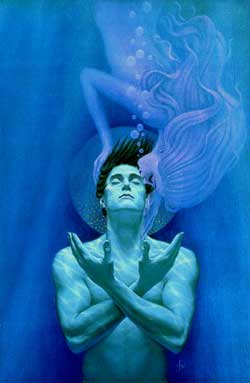ATTENTION: THE SCRIPTSHADOW NEWSLETTER HAS BEEN SENT – Check your Spam and Promotions Folders if you did not receive. Hope you enjoy it!
Genre: Cray-Cray
Premise: When humanity discovers a human on Mars, they bring him home, where he learns all about the peculiarities of earth.
About: This adaptation of the classic sci-fi novel was written in 1995 specifically as a vehicle for Tom Hanks (this would’ve been right after Forrest Gump). The script was written by Dan Waters, who became a screenwriting sensation after the cult film everyone in Hollywood loved, Heathers. Waters wrote Batman Returns and Demolition Man in 1992, but has had trouble finding credits since (his most recent film is Vampire Academy). Paramount, who commandeered the project, seems set on bringing these old sci-fi novels to life, as they just bought the rights to The Stars My Destination last week (another Heinlein novel). Robert Heinlein is a legend in the sci-fi community, penning tons of books, including the sci-fi classic, Starship Troopers. Don’t tell Paul Verhoeven (who directed the film version of Troopers) that though. The director is said to have never read the book: “I stopped after two chapters because it was so boring,” he said. “It is really quite a bad book.” He later asked a friend to just explain it to him.
Writer: Dan Waters
Details: 156 pages! – 5/22/95 draft
Before you read this review I need you to go to Amsterdam, locate the nearest Mushroom store, and buy as many mushrooms as you can afford. Eat them. Then, and only then, will you have a chance at understanding this screenplay and my review of it.
I’ve read some fucked up stuff in my day. But this is the kind of script that makes David Lynch look like John Lee Hancock. I’m pretty sure I know why Tom Hanks passed on this. Because he couldn’t find a translator to make sense of it.
This is Birdman meets sci-fi meets Forrest Gump. Which may sound delightful to some of you. But I’m warning you. After you read this, there’s a 14% chance you may no longer understand the English language.
Stranger in a Strange Land starts when our first expedition to Mars ends in us finding a naked man running around the red planet with a bunch of rock monsters.
Mmm-hmmmm.
Okay.
The Marstronauts grab the human Martian, named “Mike,” and bring him back to earth. This new earth is very different from the earth we know now. While we no longer have war, the government’s been globalized, and radical religious leaders have become the most important figureheads on the planet.
A female reporter, Gillian, sneaks in to the hospital to get a story on Mike, then ends up stealing him and the two go on an adventure together. Where? To Jubal Harshaw’s house of course. Who’s that, you may ask? An ex ghost writer. And physician. And lawyer. Who now owns a hippy compound.
Sure. Why not?
What happens next? Well, by all measurable accounts , absolutely nothing for the next 40 pages. We just hang out at Jubal’s house where Mike, who speaks some gibberish form of English (“You happy me very,”) reads books and learns about humanity!
Eventually, a “sort-of” plot emerges where we learn that Mike’s parents, who owned a billion dollar corporation, died in a mysterious plane crash and the World Organization took over their company. With Mike being the son, he’s technically the heir to that fortune, which means the WO may have reason to turn him into rock food.
What happens next may or may not have something to do with group sex. And death. And people eating the dead. And speaking to people from the afterlife. I can neither confirm nor deny that there are three scenes that actually make sense in this script. Or that an ending that actually wraps things up exists. You will have to read the script yourself to find out. Please report back to me once you do. Insanity hurts.
I’m not going to lie. After finishing this, I wasn’t sure the writer had ever written a screenplay before. Or anything for that matter. If this was a menu, it would’ve started with the instructions for building a treehouse. And it would’ve been in Chinese.
As an experiment, I read five pages of this script out of order and then five pages in order. The five pages out of order made slightly more sense than the consecutive ones. Which should tell you what you’re in for here. Since it’s hard to know who’s responsible for the incomprehensible nature of the story, because I’ve never read the novel, I’ll just assume that both of these guys are off their rockers. I mean, who the hell were the people celebrating this novel when it came out? CIA-obsessed transients who mumble the ingredients of ketchup to themselves at the Santa Monica McDonald’s?
While I could probably key in on 184 things that were wrong with this screenplay, I’ll start with an obvious one. If you’re going to center a story around a man who’s supposedly different from everybody else, you probably don’t want to make everybody around him just as crazy as he is. By doing so, the character doesn’t stick out at all.
Indeed, Mike is swallowed up by this screenplay. In the first 70 pages, he gets about 15% of the screen time. Instead, we focus on hippy-extraordinaire, Jubal Harshaw, a name that could only have been conceived with the influence of at least a dozen hallucinogens.
And then there’s the structure, or lack there of. Look, we all know that books go on for longer than screenplays. This is why they bring in screenwriters to adapt novels and not novelists. Because screenwriters specifically know how to cut stuff down and focus on the things that matter. They know how to EDIT.
Dan Waters never got that e-mail. This is 157 pages of Wanderosa, heavy on the random. Why in the world would you write a 40 page sequence at a man’s house without a single plot point pushing the story forward? I can find absolutely no excuse for this.
The core of every screenplay is the character goal. It’s giving your protagonist something they’re after and then pushing them towards that something. If you don’t do that, you’re going to end up with a screenplay that goes nowhere – that lasts 157 pages. Even in the most optimistic scenario, where this is an exploratory first draft, there was no attempt by the writer to rein in this story at all.
And it doomed them. If you’re Tom Hanks and you read this, you see your character featured 5 times in 70 pages and you don’t start putting together notes for the next draft. You say, “See ya later.” You have to at least put the illusion together that you tried. Any schmoe off the street can write a bunch of random thoughts for 157 pages. Skilled screenwriters are the ones who can find the core of a story and build a structure around it.
Or maybe… maybe Waters knew this was doomed from the get-go. There is something in production circles known as “suspension of disbelief.” If the audience can’t get past the artificial reality you’ve created, it doesn’t matter what you write. Is there any scenario under which a naked man running around on Mars with rock alien brothers is going to work? Probably not. So Waters just said, “Fuck it. If I’m going nuts, I’m going nuts all the way.”
It just goes to show that some properties aren’t meant to be turned into movies. Although maybe this is another opportunity to explore angles, like we did last Thursday. Might the Scriptshadow community have an angle for Stranger in a Strange Land that actually works? Share your thoughts in the comments section. In the meantime, I’m going to go research lobotomies.
Script link: Stranger in a Strange Land
[x] what the hell did I just read?
[ ] wasn’t for me
[ ] worth the read
[ ] impressive
[ ] genius
What I learned: For you writers out there who don’t believe in outlining, READ THIS SCRIPT. This is what happens when you don’t outline.



